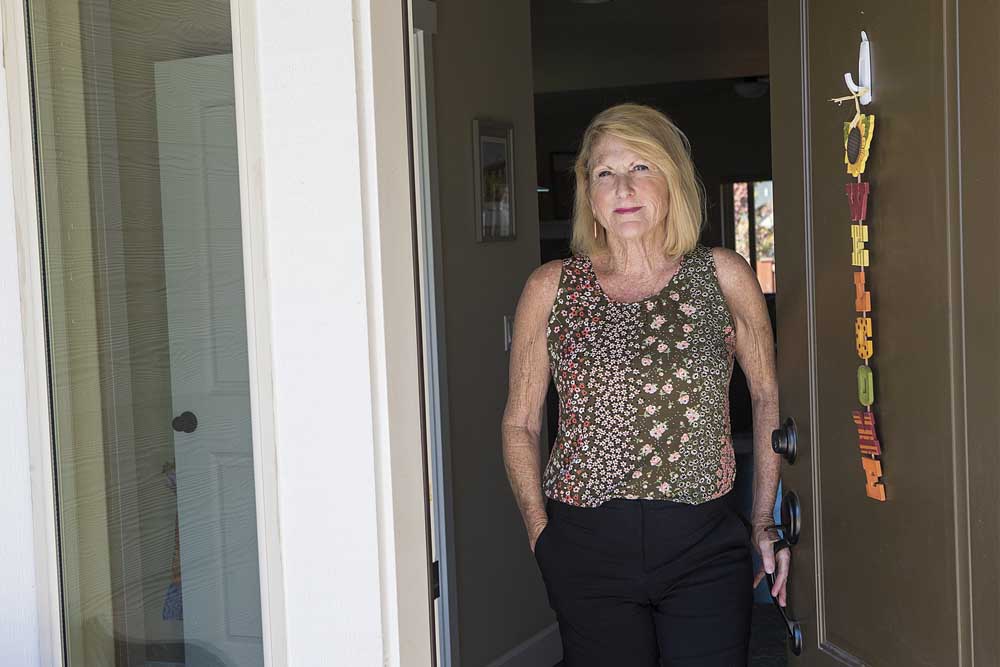Redmond resident talks about getting breakthrough COVID-19
Published 5:00 am Tuesday, September 28, 2021

- Maureen Meade stands in the front entry of her Redmond home on Friday. Meade was in quarantine after testing positive for COVID-19 earlier in the week. She had been vaccinated in April.
Never did Maureen Meade think that she would get COVID-19.
She had been fully vaccinated as soon as she could get an appointment. She wore a mask. She maintained her distance from others. And she was a runner who lived a healthy lifestyle.
But on a quick trip to South Dakota to run in the Mt. Rushmore half-marathon on Sept. 18, she had forgotten her KN95 mask and instead used a temporary disposable mask. She met up with a high school friend who runs marathons with her. She completed the half-marathon in 3 hours, 25 minutes.
But the day after the run, a Sunday, she woke up with a runny nose, bloodshot eyes and was sneezing. Looking back she realized those were probably early symptoms of COVID-19. Meade, a 66-year-old Redmond resident, at first thought it was allergies.
On Tuesday, Sept. 21, the symptoms worsened and she had body aches. Her joints hurt. She had a fever.
That’s when she knew. She must have gotten COVID-19 while traveling and sitting for hours on crowded planes and at airports.
“I think I got it at the airport,” Meade said. “Since last November I have flown eight times, and I always wore a NK95 mask, but this trip I forgot it.”
Her symptoms were severe enough that just driving to St. Charles Redmond’s emergency department was difficult.
She tested positive for COVID-19, and her doctor quickly got her on a list to receive the monoclonal antibody treatment on Wednesday at St. Charles Bend. Just minutes after receiving the intravenous treatment, she said, she felt better.
“I drove myself home, and I felt so much better,” Meade said. “I had energy. My headache wasn’t as bad. And my temperature dropped. It had already taken effect.”
Had Meade not been fully vaccinated, she might have had a worse experience with COVID-19, she said. The Centers for Disease Control and Prevention recommends vaccines for everyone ages 12 and older and recently announced that people 65 and older should get a booster vaccine.
Until this week, the monoclonal antibody treatment was only available at St. Charles Bend in Central Oregon. But starting this week Mosaic Medical will also be offering the treatment to patients in Madras and Redmond, said Kyle Mills, Mosaic Medical clinical pharmacist.
The antibody treatment works like a blanket over the virus, covering it so it cannot bind to cells in a body. That makes it harder for the virus to infect a person, Mills said. It can be used on patients who have been vaccinated or are unvaccinated.
But it is reserved for people who are at high risk, including those over age 65, and must be administered within a 10 day window of the first COVID-19 symptom.
“People who are unvaccinated are at much higher risk of becoming sicker from COVID-19,” Mills said. “Vaccines are 65 to 95% effective from preventing people becoming severely ill. This treatment helps prevent hospitalizations. Our hospitals are overloaded right now.”
St. Charles Bend on Monday had 85 patients with COVID-19, according to the hospital’s website. All but one of the 14 COVID-19 patients in the intensive care unit were on a ventilator, according to the hospital. Two of the intensive care patients were fully vaccinated, and seven were not fully vaccinated and under age 60. More than 80% of the COVID-19 patients at St. Charles Bend were not vaccinated, according to the hospital.
After receiving the antibody treatment, Meade said she has felt so much better. During the past 10 days, she’s stayed home in quarantine until she tests negative for COVID-19. She’s had a lot of time to think. She will never leave home again without her KN95 mask, she said.
“I learned my lesson,” Meade said.
She now thinks she might have been running with the virus. A seasoned runner, Meade said at one point her heart rate soared to 180 beats per minute and while the terrain was steep, she usually never breaks 120 beats per minute.
“I’m one of eight children, and you learn not to complain unless you’re dying,” Meade said. “I always think that my symptoms are something less.”
Looking ahead, she’ll go out with friends and family, but outdoors. She had planned a trip next week to California to see her daughter. She’s still on the fence if she’s going.
“I will be extra careful and be judicious about the people I’m around and wear my mask if I have to go into a store,” Meade said. “I’m going to be extra careful.
“I’m not afraid to get back on a plane, but I will keep my mask on the entire time. I won’t eat or drink.”






